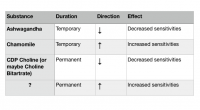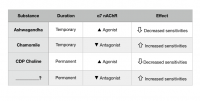I'll break it down, sorry if I was unclear earlier, should probably have done this - all of the things you list? They alter cholinergic signalling - acetylcholine, which is what nACH-7 receptors respond to, is created from choline.
@Stinkorninjor It sounds like you are so spot on!!!!  Thank you so much! I'm honestly excited at your discovery. I hope I'm not getting excited too soon, because I've been wrong before with different theories.
Thank you so much! I'm honestly excited at your discovery. I hope I'm not getting excited too soon, because I've been wrong before with different theories.
Here's the thing though... I am having a difficult time with the concept of simply "too much acetylcholine," because as you've said, this is very specific to α7 nAChR's. In a normal person without this disorder, the body instantly has a way to readjust when a7 nAChR's are over-active or under-active. For example, Chamomile used to work within minutes to bring back my sensitivities. I'm convinced the body has an endogenous substance to normally re-establish homeostasis when they are over-active. We know that CDP-Choline is an endogenous α7 nAChR agonist. There has to be something in the body that causes the opposite, doesn't there? Are there any endogenous α7 nAChR antagonists that come up on PubMed or elsewhere?
No, there are no known antagonists of Choline or Acetylcholine.
I just realized that I was incorrect in my previous statement, because I just realized that there ARE endogenous antagonists...! Most famously, kynurenic acid is a antagonist at the NMDA-receptor sites, which are instead agonised by Glutamate.
That's the only endogenous antagonist I know of though... Antagonists are, for apparently evolutionary reasons, much more rarely occuring in our bodies - usually there's instead INdirect antagonism - signalling is decreased through feedback-loops - Norepinephrinergic Alpha-2-receptors antagonise cAMP activity, for instance. Choline and Dopamine has a semi-antagonistic relationship - there's also auto-receptors, like I said, when they are activated, they cause a feedback-loop which shuts down activity from other receptors in the same group.
(alpha-2-receptors are actually also auto-receptors for Norepinephrine, and cause decreased NE-release, leading to indirect antagonism at other NE-receptors, since there'll be less NE to activate them)
--EDIT while writing --
Wait... I'm a dummy... I forgot! Right... KYNA - Kynurenic Acid - is also an antagonist of alpha-7-receptors! That's another aspect of why it's bad when it's increased in Schizophrenia - it causes cognitive issues for schizo's, while the NMDA-antagonistic effects causes the hallucinations and delusions!
God-damn, I actually forgot...!
Kynurenic acid as an Antagonist of α7 Nicotinic Acetylcholine Receptors in the Brain: Facts and Challenges
https://www.ncbi.nlm...les/PMC3721521/
(I recommend you read the entire article - the info is hella' solid.)
Reading about it... It doesn't seem clear-cut though... it's actually not been sufficiently proven, there's no consensus that it actually does that.
There's also the fact that KYNA is a hella' dirty weapon! Firstly, it primarily antagonises NMDA-receptors, but that's not all - it hits a multitude of other receptors as well - so there's no telling what it would do to someone with Dysautonomia!
However... if you wish to try to raise your endogenous KYNA-levels, there's another complicated dietary approach - like previously mentioned, KYNA is raised by Ketogenic Diet - eliminate ALL carbohydrates, feed exclusively off of fat, and your KYNA will go up, and, hypothetically, start lowering your Alpha-7-mediated signalling.
I believe there is also a drug in development for the treatment of Alzheimers... it's a prodrug for a compound closely related to KYNA, some variation of kynurenic acid - can't recall the name though. HOWever... That compound is not a 1:1 equivalent to KYNA - it's not certain that it does ALL of the same things - so far, all it's been found to do, is to antagonise NMDA-receptors - that doesn't mean it's also an Alpha-7-antagonist.































































